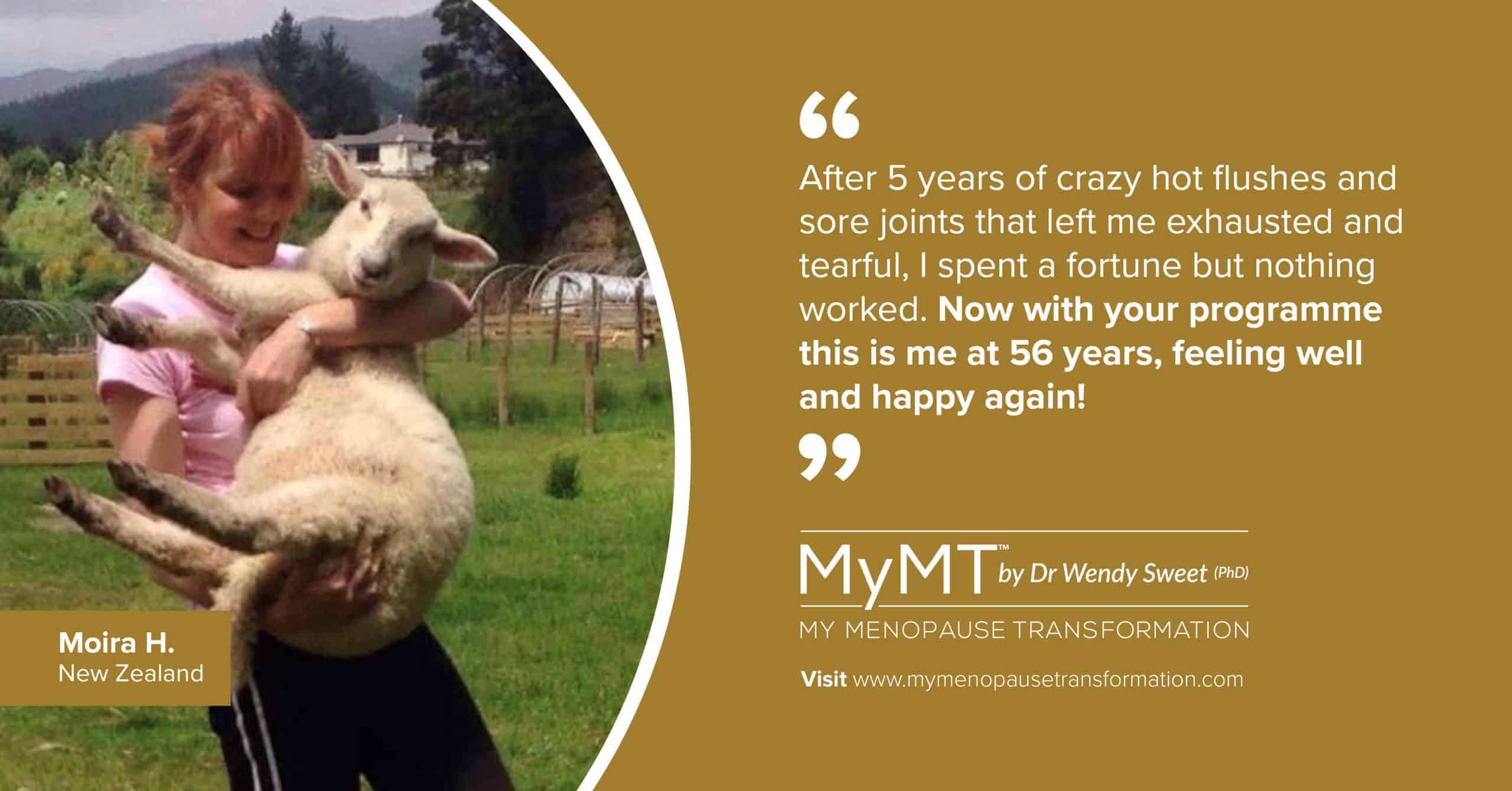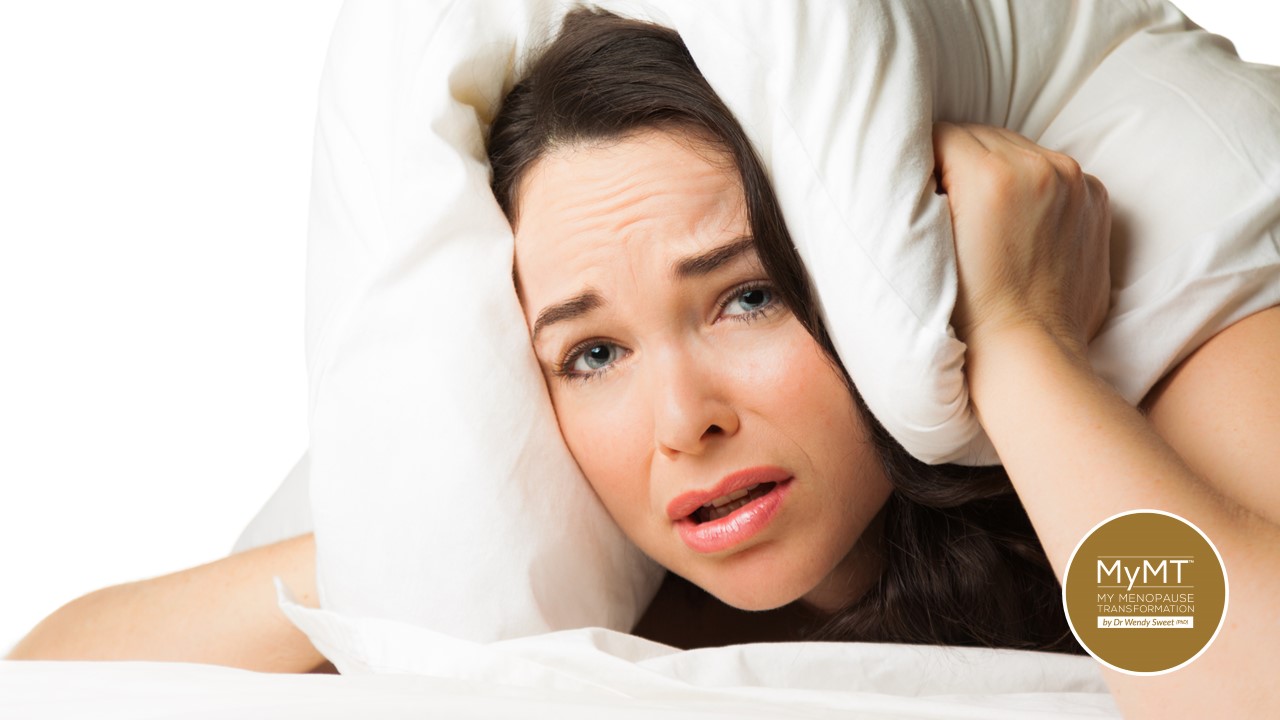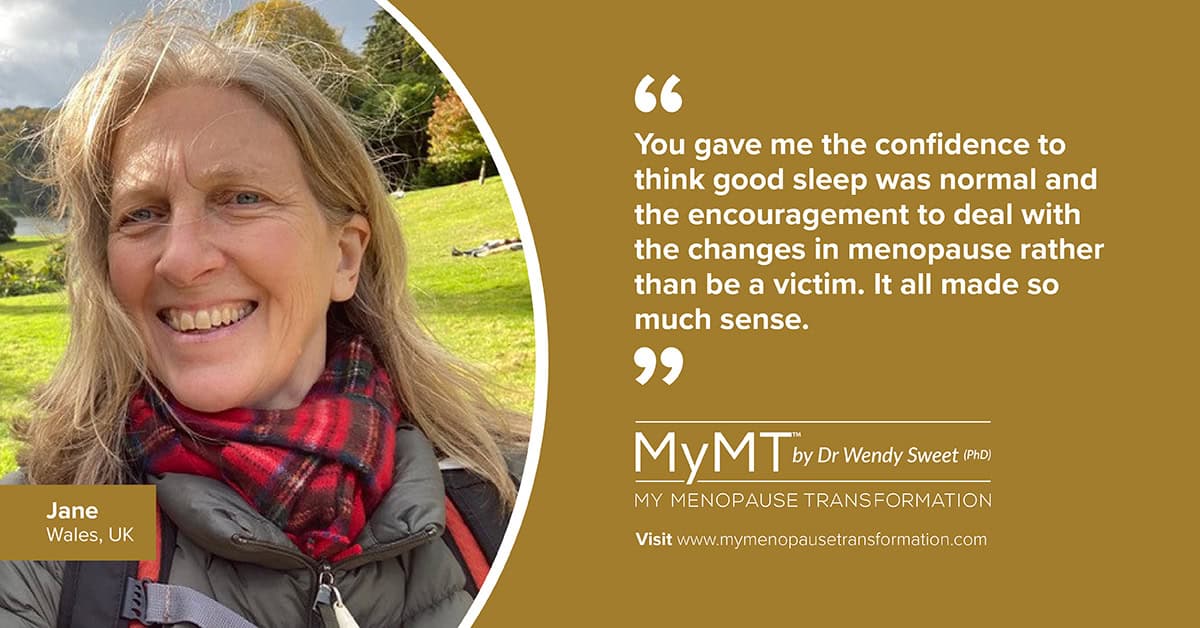“Sleep touches on nearly every aspect of our physiology and psychology, of our interaction with the world and with others.”
William Dement (2000), Sleep Research Pioneer.
Do you need to focus more on your melatonin production to reduce your menopause symptoms, especially as the seasons change?
It’s an interesting question isn’t it? And I’m asking it, based on relatively new research about our sleep hormone, called melatonin, and the pleotropic effect it has on women’s health in menopause. The term ‘pleiotropic’ means ‘effects around the body’ and when it comes to melatonin and our menopause transition, the role of this hormone has a greater effect throughout our body than many of us may realise.
Melatonin is able to regulate several physiological functions from well-known sleep/wake cycles to nervous system protection as well as regulation of both the immune and hormonal systems. It also influences our energy organelles, the mitochondria. The researchers called this effect, ‘cross-talk‘ between melatonin and our reproductive hormones. [Cipolla-Neto et al, 2022]
Every week I get emails from women who are exhausted and exasperated from not sleeping. Is this you as well?
This is a bit of a concern, because for women living to around 80-82 years of age, they (hopefully) will have slept for a staggering 27 years! That’s why focusing on sleep is one of the most fundamental aspects of our health management that we can achieve as we age.
But sleep can be problematic for women in their midlife and older years, as many of you already realise. Many of them complain to me that they are still not sleeping, despite menopause-HRT and numerous supplements, which are costing them a small fortune.
Hence, after reading some of the work of William Dement as well as the new research this week, I’m wondering if, because the seasons are changing, you need renewed attention to your sleep routines and your natural melatonin production.
I think we’ve all heard of Melatonin.
It’s the hormone released from a tiny gland in our brain that sets and resets our circadian drive for sleep. If you’ve watched my Masterclass on Menopause, you’ll know that I talk about how, as we move through menopause and age, our melatonin production declines. This is a natural part of our human ageing.
Melatonin levels decline gradually over the life-span. Researchers believe that this decline may be related to lowered sleep duration and depth in women during and after the menopause.
Because of this decline, some deterioration of many functions and processes around our body that are controlled by circadian rhythms may arise. The circadian rhythms are the natural day/ night rhythms that help your body to function, but there are seasonal variations on circadian rhythms as well.
When the seasons change, melatonin production changes too, hence, symptoms in menopause can also change on a seasonal pattern. Good to know!

Melatonin is your ‘go-to-sleep’ hormone and in a 2007 study by Grivas and Savvidou, it was described as “the light of the night”. As it is secreted from the pineal gland principally in the evening hours, researchers better understand the role of melatonin and it’s involvement in a number of other cyclical bodily functions.
I’ve fielded a number of emails about jet-lag lately as some of the Northern Hemisphere ladies on the MyMT™ programmes prepare for their summer travel. I always talk about the need to get into the destination time-zone as quickly as possible and of course, look after the gut microbiome – afterall, this is affected by seasonal changes during menopause and of course, circadian disruption as well.
Melatonin is an important hormone to focus on during the menopause transition, because it is exclusively involved in signalling the ‘time of day’ and ‘time of year’. Hence, why we may get out of sorts when we travel over the dateline or the seasons change and we have to cope with daylight savings. Melatonin is therefore, considered to be the body’s chronological pacemaker or ‘Zeitgeber’.
As sleep research has expanded over the last decade or so, melatonin supplements have been used as a therapeutic chemical in a large spectrum of diseases, mainly in sleep disturbances.
Whilst melatonin medications are not as ideal as training your brain to produce it’s own melatonin, because taking a synthetic melatonin will reduce your body’s ability to produce it’s own melatonin, sometimes it may be indicated during seasonal changes in sleep or when you are jet-lagged.
Melatonin Levels are Important to Regulate During Seasonal Changes:
With the rapid expansion of sleep research over the past two decades, researchers better understand that this powerful and essential hormone may also play a role in the biologic regulation of mood, depression, cardiovascular system health, reproductive health, (hence the interest in menopause and melatonin) and of course, our ageing.
Inadequate sleep causes hot flushes and night sweats to become worse, and may contribute to depression and anxiety. Not enough sleep also affects your body’s ability to regulate stress hormones which can also lead to high blood pressure.
Getting enough quality sleep is also crucial for maintaining healthy levels of hormones that control appetite and blood glucose levels as well as energy . It’s why, if you aren’t sleeping, you might also be putting on weight.
That’s why I want to share this new research with you about melatonin – it seems that there’s a lot more to this powerful hormone than previously thought.
Researchers have discovered that melatonin is not only produced in the pineal gland (in the brain), it’s also produced locally in the bone marrow and the retina of the eye, in the gastrointestinal tract, the testes in males, and in human lymphocytes (white cells).
As such, when levels of melatonin decline as we age, there are effects around the body.
This matters to women in menopause, because the inter-connection between all of our hormones, means that the natural decline of our reproductive hormones during menopause also impacts the production and action of melatonin around the body.
If you’ve been following my articles for a while, you’ll know that I’m often telling you about your changing sleep patterns during menopause and how these impact your hot flushes, night sweats, sore joints, depression and even your gut health.
But did you know that with the changes to your sleep patterns, especially as the seasons change, and with the subsequent decline in melatonin production, this is having an effect on your bone density, gut and cardiac health and immune health too?
No, nor did I.
The aim of the review that I was reading this week was to explore the effect of melatonin supplements on women’s health and their bothersome symptoms during menopause. (Treister-Goltzman & Peleg, 2021). It made for interesting and curious reading, including the knowledge that disruptions in the circadian patterns of melatonin production, leads to numerous physiological changes in the body. Many of these changes relate to our symptoms during menopause.
Whilst the authors of the study mentioned that further studies needed to be undertaken and not all of the studies that they explored in their analysis showed a positive correlation of melatonin with menopause symptom reversal, their analysis of 24 studies on melatonin and women’s health, with a total of over 1300 participants, revealed that melatonin supplementation of 3-5mg over 6-12 months helped improve:
- Sleep quality in women with a pre-existing sleep impairment (which in turn improved immune function).
- Bone mineral density
- Weight loss in overweight women
- Mood state.
In women, the effects of melatonin on our reproductive functioning is important throughout our lifetime.
Whilst levels of melatonin oscillate throughout the menstrual cycle, the problem that we have in menopause and post-menopause, is that melatonin levels decline with age. And altered melatonin levels coincide with changes to our health – sleep disorders, inflammatory changes, bone density concerns and of course, immune health changes and increased risk for heart disease.
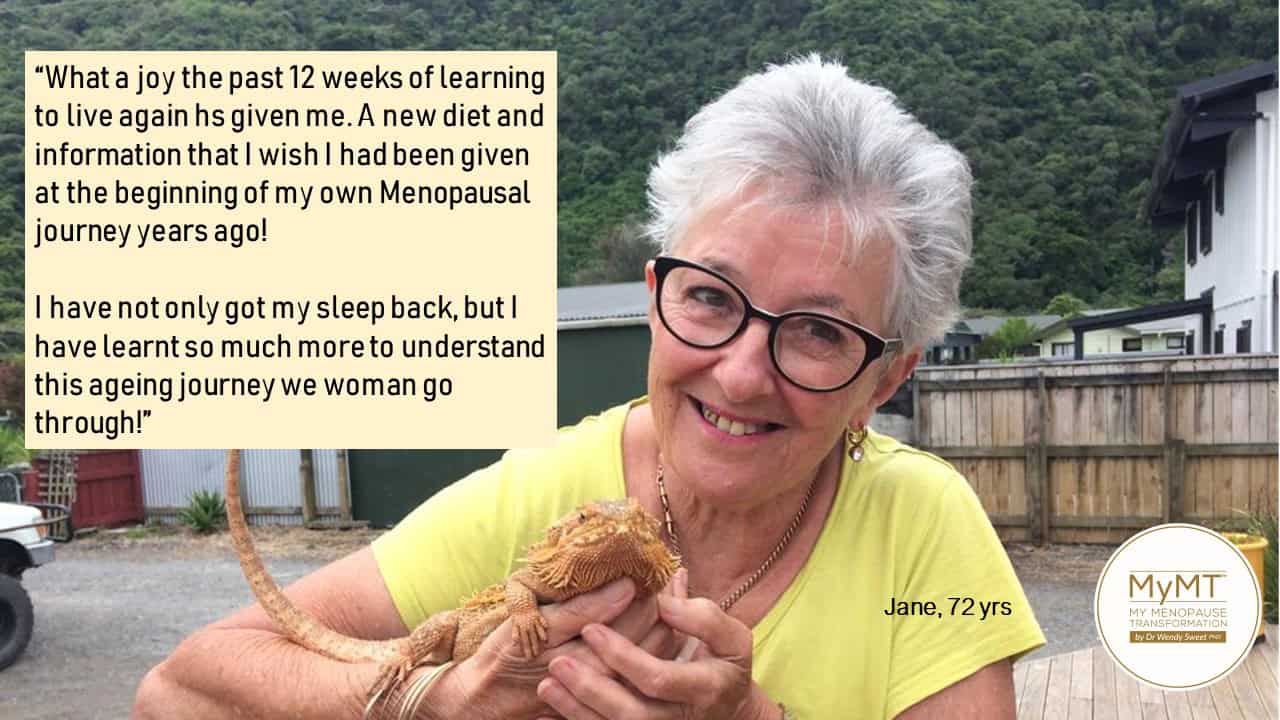
In both of my 12 week programmes, the very first module women listen to is simply called ‘Sleep All Night’. It has the evidenced lifestyle information that women need to put into place, specific to their menopause transition and changing melatonin patterns.
It’s hard to function day after day when we don’t have enough sleep, so my intent in my programmes is that you understand the scientifically evidenced lifestyle solutions that you need to put into place during your menopause transition.
TWO LIFESTYLE CHANGES TO HELP YOU SLEEP!
One of these lifestyle changes you can make during menopause, is to avoid sugary foods and drinks at least 3 hours before you go to bed. Yes indeed, this does include alcohol, which is full of sugar.
Sugar increases the production of insulin which is a hormone that carries glucose to specific tissues and organs around the body.
One of these organs is the brain.
And when insulin is carrying blood glucose to the brain, it crosses the blood-brain barrier and interferes with melatonin production and secretion. Hence, an important aspect for women struggling to get on top of their sleep is to look at their diet, especially in the evening.
Adding foods to the diet which contain tryptophan is another aspect of how we can raise our natural levels of melatonin. Tryptophan foods help to produce serontonin which helps to produce melatonin. These foods include salmon, fish, lean beef, turkey, bananas and more! But because Tryptophan is absorbed via the small intestine, if women have gut health concerns, then getting on top of this is a priority. Poor gut health and insomnia go hand-in-hand, and vice versa. I have this information in the MyMT™ programmes for you.
Millions of women around the world and their health advisors think that menopause is ‘just’ about hot flushes, but it’s not.
There are many more changes going on at this stage of life than we realise. Whether it’s sore joints, depression, insomnia, anxiety, brain fog or heart palpitations and hot flushes, it’s important for our health to turn these symptoms around as we age.
There’s so much pressure on women these days and stress has a lot to do with our symptoms as well as not sleeping. As the year moves on and life gets even busier, I want to support you to turn these issues around.
This means that you will have the solutions to sleep all night, reduce your hot flushes, anxiety or depression and turn around your sore joints or heart palpitations using evidenced lifestyle solutions. It doesn’t matter if you are already on HRT or anti-depressants either – I don’t interfere with any medical solutions as this is between you and your Doctor.
With bonus modules for joint health, heart health, gut health and mindfulness, this programme is fantastic value. I even have optional modules with lifestyle solutions for women taking HRT and/or anti-depressants.
I can’t wait for you to join me on either of these powerful lifestyle programmes that teach you how to adjust your lifestyle using scientifically evidenced solutions to accommodate the change of life and reduce your symptoms and/or your weight.
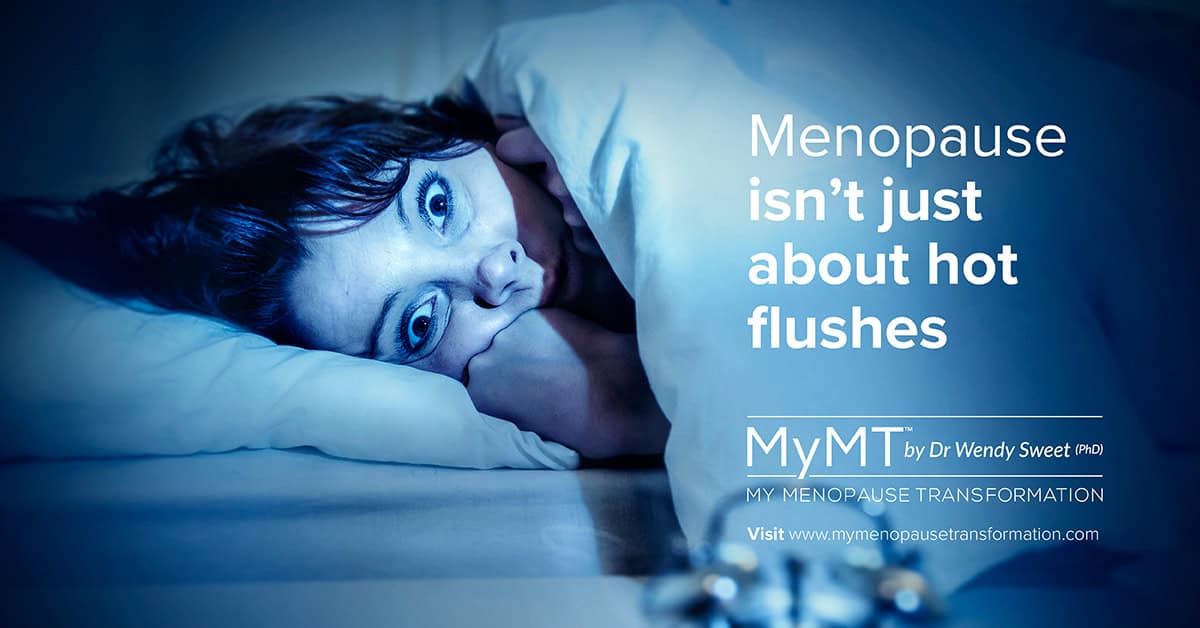
References:
Cipolla-Neto J, Amaral F, G, Soares, Jr J, M, Gallo C, C, Furtado A, Cavaco J, E, Gonçalves I, Santos C, R, A, Quintela T. (2022). The Crosstalk between Melatonin and Sex Steroid Hormones. Neuroendocrinology 2022;112:115-129. doi: 10.1159/000516148
Grivas T. & Savvidou O. (2007). Melatonin the “light of night” in human biology and adolescent idiopathic scoliosis. Scoliosis. 4(2)6. doi: 10.1186/1748-7161-2-6. PMID: 17408483; PMCID: PMC1855314.
Gursoy A., Kiseli M., & Caglar G. (2015). Melatonin in aging women. Climacteric. 18(6):790-6. doi: 10.3109/13697137.2015.1052393. Epub 2015 Sep 25. PMID: 26029988.
Karasek M. (2004). Melatonin, human aging, and age-related diseases. Exp Gerontol. 39(11-12):1723-9. doi: 10.1016/j.exger.2004.04.012. PMID: 15582288.
Treister-Goltzman, Y. & Peleg, R. (2021). Melatonin and the health of menopausal women: A systematic review. J. of Pineal Research, 71(2), 1-12
Wehr TA. (1997). Melatonin and seasonal rhythms. J Biol Rhythms. Dec;12(6):518-27.
West, C. & Egger G. (2017). Lifestyle Medicine, [Chapter 18], To Sleep, Perchance to …. Get everything else right. 3rd Ed. Elselvier Academic Press.
